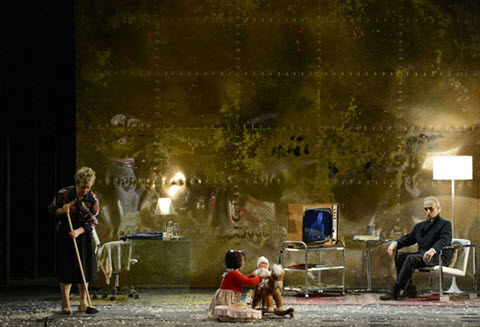 Spain Kolonovits: El Juez (Los Niños Perdidos), BIOS Orchestra, Rossini Choir, David Giménez (conductor), Teatro Arriaga, Bilbao, 26.4.2014 (JMI)
Spain Kolonovits: El Juez (Los Niños Perdidos), BIOS Orchestra, Rossini Choir, David Giménez (conductor), Teatro Arriaga, Bilbao, 26.4.2014 (JMI)

World Premier
Cast:
The Judge: Josep Carreras
Alberto: José Luis Sola
Paula: Sabina Puértolas
Morales: Carlo Colombara
Abbess: Ana Ibarra
Old Woman: Milagros Martín
Paco (Cameraman): Manel Esteve
Nun/María: María José Suárez
Nun: Itiziar de Unda
Production: Teatro Arriaga and Kupfer Kultur & Media Vienna
Direction: Emilio Sagi
Sets: Daniel Bianco
Costumes: Pepa Ojanguren
Lighting: Eduardo Bravo
The premiere of this work in Bilbao aroused great expectations in opera circles, especially because of the return of Josep Carreras, and Teatro Arriaga and its artistic director, Emilio Sagi, fulfilled them. Not only was the theater packed, there was an unusually large presence of opera lovers from other countries, including a group from Japan who came to Bilbao to pay tribute to their idol and exhibited a big Catalan flag. Teatro Arriaga has not achieved this level of success for an opera performance since Placido Domingo’s Otello almost 25 years ago.
El Juez (The Judge or The Lost Children) has a libretto by Angelika Messner and is based on a dramatic event that took place during Franco’s dictatorship, one that only came to light a few years ago. Newborn children were taken from their mothers and officially declared to have been born dead; Sister Maria (who recently passed away) then gave the children to other parents to secure a better Christian education. Drawing upon this dramatic event, Ms. Messner has written a libretto worthy of a television soap opera.
Christian Kolonovits is better known in the music world for his pop music, music for films and orchestral arrangements than for his operas;I’ve only seen his Antonia und der Reißteufel, which is often presented at the Vienna Volksoper. The score for El Juez is not of much interest, a completely tonal composition that corresponds to music made in the middle of the last century. The Austrian composer knew that he was writing for an opera idol, and there are some cantabile pages here and there, including two ariosos for the Judge, a duet for the young couple (Alberto and Paula) and two other ariosos for, respectively, Morales and the Abbess (also known as the Black Magpie). Apart from these, there are many recitatives ̶ too many ̶ and music that is short on inspiration in general. I think that one of the main problems with the opera is that it is too long: if libretto and score were cut by some 45 minutes (more or less an entire act), things might work better. In any case, the audience that filled Teatro Arriaga seemed not to share my opinion, and their enthusiastic response to the production included both composer and librettist.
The protagonist who gives the title to the opera and was the great focus of attention at the event was Josep Carreras, without whom the opera would have gone unnoticed. It has been over 30 years since Carreras last sang an opera in Bilbao (Abao, 1981) and 13 years from the last time he sang an entire opera in Spain (Barcelona, 2001). Much has happened since then and, obviously, Carreras’s voice is not what it once was. He is 5 years younger than Placido Domingo, but his vocal state is less strong. He maintains a few notes in the middle range, but his timbre has lost that luster that made him famous in the past, and the two ends of the tessitura are rather weak. I don’t see how he could face the challenge of singing a role from the main repertoire, but it’s a different thing with an opera written for him by a composer who understands perfectly his vocal limits. Mr. Carreras still exhibits strong intensity in his singing and easily conveys emotion to an audience ready to pay tribute. This was an occasion to give well-deserved homage to a great singer, whose career was almost truncated by disease.
The best singing in the rest of the cast came from José Luis Sola in the character of Alberto (the judge’s brother). I think it’s the best performance I’ve seen from him: he sang with gusto and handled his voice perfectly. Sabina Puértolas played the part of Paula, the journalist who follows the plot of the stolen children and falls in love with Alberto. From my point of view, the character requires a more dramatic soprano than hers, which is a light soprano with a reduced size and a fairly acid top. Carlo Colombara was well-suited to the role of Morales, the leader of the ultra-right movement. He had a good stage presence and an attractive voice in the middle although somewhat pale at the top. AnaIbarra offered a remarkable interpretation of the Abbess, who represents the character of Sor María, although here she does not give children to others but rather takes them to the convent and educates them in her religion. The secondary characters were well covered.
Emilio Sagi’s production is well suited to the drama: a dark atmosphere with minimal sets before a large metallic wall that represents the convent. Costumes and lighting are a good complement to an attractive stage production. The direction was not particularly impressive, falling somewhat short with the two young people while it worked better with the others. In short, it is not Emilio Sagi’s best work but it serves the opera perfectly.
The musical direction was entrusted to David Giménez Carreras, who led a safe reading of the score by a sound BIOS Orkestra.
As I indicated above, Teatro Arriaga was fully sold out, and the audience offered a triumphant reception to the artists, especially to Josep Carreras. Some of the biggest cheers were justly dedicated to José Luis Sola.
José Mª. Irurzun